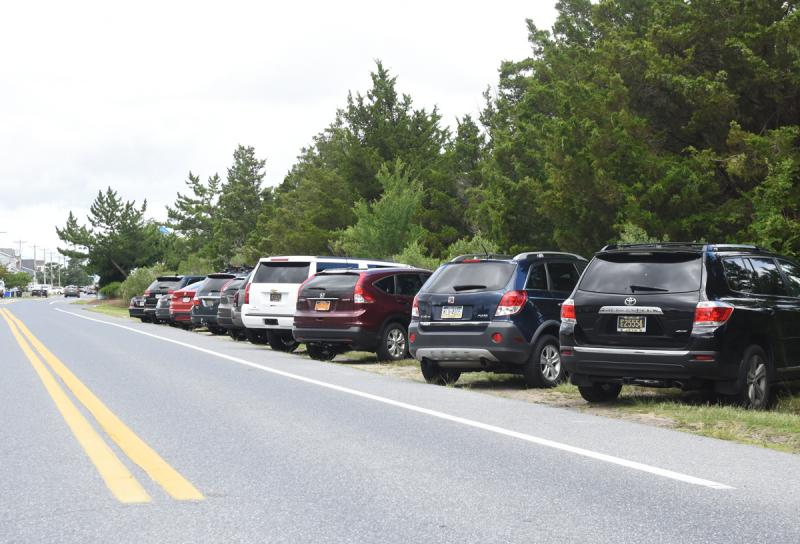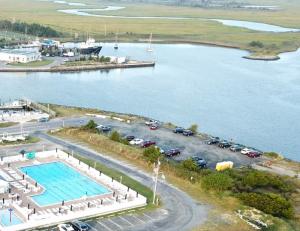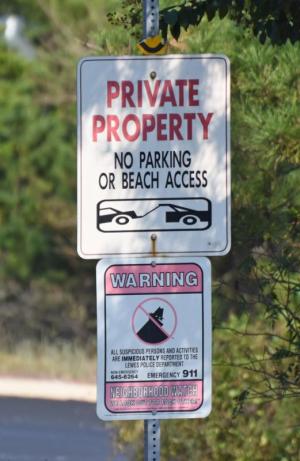Lewes Beach Parking Committee members say clearly marked parking spaces at Roosevelt Inlet and on parts of Cedar Street will improve parking on Lewes Beach.
The group made a recommendation at its Oct. 2 meeting that city council explore the feasibility of creating spaces at three heavily used areas: Roosevelt Inlet and in front of Lewes Yacht Club and Children’s Beach House.
If the city moves forward to delineate spaces at Roosevelt Inlet, it will likely need permission from the Department of Natural Resources and Environmental Control before striping the state-owned stone lot. Head-in parking in front of Lewes Yacht Club and Children’s Beach House is within city right of way and does not require special permission. The recommendation also included striping a half-dozen spaces on Maine Avenue next to the yacht club.
Committee member Pres Lee, property committee chairman for Children’s Beach House, raised safety concerns about people parking head-in in front of the facility. He said people often stand on Cedar Street to unload their vehicles.
City Manager Ann Marie Townshend said by clearly marking parking spaces, city officials can guarantee at least 18 feet of depth to ensure safety. She suggested vegetation in the city’s right of way could be trimmed to make room.
This was the third straight committee meeting dedicated to developing recommendations for council.
So far, the committee has recommended installing fencing at the base of the sand dunes from the main beaches at the end of Savannah Road out to Roosevelt Inlet, as determined by city officials, and including necessary signage. The committee also recommended a stronger police presence on the beach and streets to deter inappropriate activity, such as littering, changing in and out of beach attire, and using the dunes and wooded areas as a bathroom.
At its Sept. 17 meeting, the committee recommended the police department strictly enforce the law prohibiting parking within 30 feet of Cedar Street intersections.
The committee deferred action on additional bathrooms on the beach, a jitney service, expanded parking at the main beach lots and parking permits.
The committee is awaiting an analysis of right-of-way encroachments by property owners on streets between Cedar Street and Bay Avenue. Code Enforcement Officer Steve Barrows said he’s three-quarters of the way done and will have a final report available at the committee’s next meeting, Tuesday, Oct. 23. At that meeting, Townshend is also expected to have a cost estimate to survey all properties between Cedar Street and Bay Avenue for precise right-of-way dimensions. She is also contacting the postmaster to discuss placement of mailboxes and the concept of grouping them together.
Beach resident Sumner Crosby said a lot of focus has been put on the residential streets from Savannah Road to Roosevelt Inlet, but the committee has not considered providing more parking opportunities from Savannah Road to Cape Henlopen Drive.
“There’s a lot of beach between Savannah Road and Cape Henlopen State Park,” he said. “Why are we not looking at better ways of accessing those public beaches for the residents of the city, county and state?”
Along that stretch is there is little to no public access to the beach. Pilot Point, Port Lewes and Cape Shores are all private communities with private streets. Although the beach is public, those communities provide little to no public parking.
Townshend said parking permits are available to the public at Cape Shores, but it is rarely done. For Pilot Point and Port Lewes, she said, the internal roadways do not support public parking.
Councilman Rob Morgan, a Cape Shores resident, said there are four entrances to the beach in his community.
”The city does not formally disclaim responsibility for maintaining the beach, but it never cleans or replenishes it,” he said.
Instead, the Cape Shores homeowners association reserves money each year for a major replenishment every several years, and by custom the state picks up 60 percent of the cost, he said.
Independent survey results
Lewes Beach resident Khalil Saliba put together an online survey independently of the committee. The survey featured just three questions and was offered to residents, visitors and family members of property owners. A total of 161 people responded.
The first question asked whether responders supported increased police enforcement to better monitor parking and behavior of residents and visitors. The idea was heavily supported, with 91 percent of responders in favor.
People were also asked if they supported better designation of all legal parking spaces at the beach, including marking spaces without compromising the aesthetics of the beach community. Responders again heavily supported the idea, with 87 percent in favor.
The final question addressed seasonal parking permits. Half of the responders were in favor of adding parking permits next summer, while another 18 percent supported the idea in 2020 or later. About a third of responders did not want parking permits at all. The question asked about a specific plan that involved two transferrable permits for residents with a limited number of permits available to visitors.
Nick Roth is the news editor. He has been with the Cape Gazette since 2012, previously covering town beats in Milton and Lewes. In addition to serving on the editorial board and handling page layout, Nick is responsible for the weekly Delaware History in Photographs feature and enjoys writing stories about the Cape Region’s history. Prior to the Cape Gazette, Nick worked for the Delmarva Media Group, including the Delaware Wave, Delaware Coast Press and Salisbury Daily Times. He also contributed to The News Journal. Originally from Boyertown, Pa., Nick attended Shippensburg University in central Pennsylvania, graduating in 2007 with a bachelor’s degree in journalism. He’s won several MDDC awards during his career for both writing and photography. In his free time, he enjoys golfing, going to the beach with his family and cheering for Philadelphia sports teams.


























































